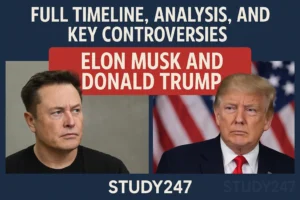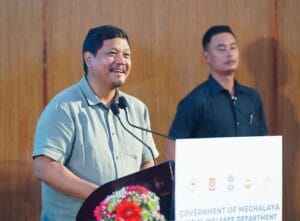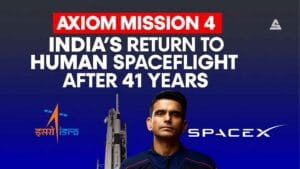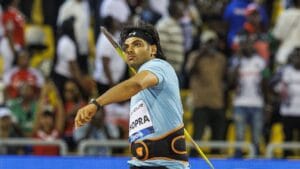Indian Polity & Constitution GK Questions for Preparation of TPSC, SSC-CGL, UPSC Civil Services, NDA, CDS, Railways and State Level Public Services Examinations.
Indian Polity and Constitution MCQ Question and Answer for all competitive Exam
1. Which Article of the Constitution abolishes untouchability?
- A. Article 42
- B. Article 15
- C. Article 14
- D. Article 17
Correct Answer: Article 17
2. Who is the chairman of the newly formed NITI Aayog replacing the Planning Commission?
- A. Prime Minister
- B. President
- C. Home Minister
- D. Minister of Planning
Correct Answer: Prime Minister
3. Who was the permanent President of the Constituent Assembly?
- A. B.N. Rao
- B. Dr. Ambedkar
- C. Dr. Rajendra Prasad
- D. Sachidanand Sinha
Correct Answer: Dr. Rajendra Prasad
4. Which Constitutional Amendment introduced the anti-defection provisions in the Constitution?
- A. 51st Amendment
- B. 52nd Amendment
- C. 53rd Amendment
- D. 54th Amendment
Correct Answer: 52nd Amendment
5. Which one of the following is NOT mentioned in the Preamble to the Constitution?
- A. Dignity of the individual
- B. Dignity of the Constitution
- C. Fraternity
- D. Unity and integrity of the Nation
Correct Answer: Dignity of the Constitution
6. After independence, the first State organised on the basis of language is
- A. Tamilnadu
- B. Kerala
- C. Karnataka
- D. Andhra Pradesh
Correct Answer: Andhra Pradesh
7. Lame-duck session of Parliament means
- A. The first session of Parliament after the elections to the Lok Sabha
- B. The last session of Parliament before the dissolution of the Lok Sabha
- C. The session of Parliament in which the no-confidence motion is discussed
- D. A session of Parliament, which fails to pass any Bill
Correct Answer: The last session of Parliament before the dissolution of the Lok Sabha
8. If a no-confidence motion is passed against a Minister
- A. The concerned Minister has to resign
- B. The whole council of Ministers has to resign
- C. The Lok Sabha has to be dissolved
- D. The Prime Minister and the concerned Minister have to resign
Correct Answer: The whole council of Ministers has to resign
9. The President has the power to nominate two members to Lok Sabha belonging to-
- A. Christian Community
- B. Anglo-Indian Community
- C. Business Community
- D. Sikh Community
Correct Answer: Anglo-Indian Community
10. Who was the Constitutional Advisor to the constituent Assembly?
- A. Dr. Ambedkar
- B. Dr. Rajendra Prasad
- C. Jawahar Lal Nehru
- D. B.N. Rao
Correct Answer: B.N. Rao
11. Who participate in the election of the vice-President?
- A. Members of the Lok Sabha
- B. Elected members of the Rajya Sabha and the Lok Sabha
- C. Members of the Rajya Sabha and the Lok Sabha
- D. Members of Legislative Assemblies of the States
Correct Answer: Members of the Rajya Sabha and the Lok Sabha
12. Which of the following directive principles of state Policy were added by 42nd Amendment?
- A. Participation of workers in the management of industry
- B. Minimising inequality of income and status
- C. Protection of environment
- D. Free legal aid to poor
Correct Answer: l,3 and 4
13. Which of the following are the types of authority attributed to the President of India?
- A. Real and popular
- B. Titular and de-jure
- C. Political and nominal
- D. Constitutional and nominal
Correct Answer: Constitutional and nominal
15. It is mandatory for the Governor to reserve a Bill for the consideration by the President if such a Bill affects
- A. The rate of land revenue
- B. Powers of High Court
- C. The powers of the Advocate General of the state
- D. The amount of salary paid to the Members of Legislative Assembly
Correct Answer: Powers of High Court
16. which is the most important reason to consider India as a Secular State?
- A. Peoples of different religions live in India
- B. Government works for the welfare of people of all religions
- C. Religion is separated from politics
- D. Minority religions are given special protection
Correct Answer: Minority religions are given special protection
17. Under Indian constitution, the concentration of wealth violates the
- A. Directive Principles
- B. Right to equality
- C. Right to freedom
- D. Concept of welfare state
Correct Answer: Directive Principles
17. The Doctrine that the Fundamental Rights cannot be amended under Article 368 was propounded by the Supreme Court in
- A. Gopalan Vs. State of Madras
- B. Keshvanand Bharati Vs. State of kerala
- C. Golaknath Vs. State of Punjab
- D. Maneka Vs. Union of India
Correct Answer: Golaknath Vs. State of Punjab
18. What was the exact Constitutional Status of the Indian Republic on January 26,1950?
- A. A Democratic Republic
- B. A Sovereign Democratic Republic
- C. A Sovereign Secular Democratic Republic
- D. A Sovereign Social Secular Democratic Republic
Correct Answer: A Sovereign Democratic Republic
19. Who amongst the following acts as the presiding officer of the House without being its member?
- A. Vice-President of lndia
- B. Speaker of Lok Sabha
- C. Chairman of the Legislative Council
- D. Speaker of the Legislative Assembly
Correct Answer: Vice-President of lndia
20. Under which Article of the Constitution of India can the President of India be impeached?
- A. 356
- B. 75
- C. 76
- D. 61
Correct Answer: 61
21. The source of all political power in India lies with
- A. Parliament
- B. The Lok Sabha
- C. The people
- D. The Constitution
Correct Answer: The Constitution
23. The authority to alter the boundaries of States in India rests with
- A. State Government
- B. President
- C. Prime Minister
- D. Parliament
Correct Answer: Parliament
24. Sarkaria Commission was concerned with
- A. Judicial Reforms
- B. Electoral Reforms
- C. Centre-State relations
- D. Financial Reforms
Correct Answer: Centre-State relations
25. The authority empowered to make laws in respect to the matters not included in any of the three lists is
- A. State Legislatures
- B. Parliament
- C. Supreme Court
- D. President
Correct Answer: Parliament
26. Writs can be issued for the enforcement of Fundamental Rights by
- A. District Courts
- B. President
- C. The Supreme Court only
- D. Both the Supreme Court and the High Courts
Correct Answer: Both the Supreme Court and the High Courts
27. If the President is to resign from office, he should address his letter of resignation to
- A. The Prime Minister
- B. The Vice-President
- C. The Speaker of Lok Sabha
- D. The Chief Justice of lndia
Correct Answer: The Vice-President
28. The joint sitting of lndian Parliament for transacting Legislative business is presided over by
- A. The President of lndia
- B. The Senior most Member of Parliament
- C. The Chairman of the Rajya Sabha
- D. The Speaker of the Lok Sabha
Correct Answer: The Speaker of the Lok Sabha
29. Which of the following categories of Rights does the Right to property belong?
- A. Legal Right
- B. Fundamental Right
- C. Human Right
- D. Natural Right
Correct Answer: Legal Right
30. Which of the following statements describes a 'Hung Parliament'?
- A. A Parliament in which no party has clear majority
- B. The Prime Minister has resigned but Parliament is not dissolved
- C. Parliament lacks quorum to conduct business
- D. A lame duck Parliament
Correct Answer: A Parliament in which no party has clear majority
31. The Fundamental duties of Indian citizens have been
- A. Originally provided by the Constitution
- B. Included in the Constitution by the 44th Amendment
- C. Included in the Constitution by the 42nd Amendment
- D. Inserted into the Constitution by a judgement of the Supreme Court
Correct Answer: Included in the Constitution by the 42nd Amendment
32. Which one of following is NOT a fundamental duty?
- A. To respect the National Anthem
- B. To safeguard public property
- C. To protect monuments and places of national importance
- D. To protect and improve the natural environment
Correct Answer: To protect monuments and places of national importance
33. The Impeachment of the President of India can be initiated in
- A. Either House of Parliament
- B. ln a joint sitting of both Houses of Parliament
- C. The Lok Sabha alone
- D. The Rajya Sabha alone
Correct Answer: Either House of Parliament
34. The Rajya Sabha has equal powers with the Lok Sabha
- A. In the matter of creating New All India Services
- B. In amending the Constitution
- C. In the removal of Government
- D. In making cut motions
Correct Answer: In amending the Constitution
35. Judicial Review in India is based on
- A. Procedure established by law
- B. Due process of law
- C. Rule of law
- D. Precedents and conventions.
Correct Answer: Procedure established by law
36. Which one of the following is NOT included in the State List in the Constitution of India?
- A. Police
- B. Law and Order
- C. Prisons
- D. Criminal Procedure Code
Correct Answer: Criminal Procedure Code
37. The State shall not make any law which takes away or abridges the Fundamental Rights. Which one of the following shall be construed as law for this purpose?
- A. Ordinance
- B. By-law
- C. Rule
- D. Constitutional Amendments
Correct Answer: Constitutional Amendments
38. Which one of the following is NOT guaranteed by the Constitution of India?
- A. Freedom to own acquire and dispose of property
- B. Freedom to move freely throughout the territory of India
- C. Freedom to assemble peacefully and without arms
- D. Freedom to practise any trade or profession
Correct Answer: Freedom to own acquire and dispose of property
39. The authority to specify as to which castes shall be deemed to be Scheduled Castes rests with the
- A. President
- B. Government
- C. Prime Minister
- D. National Commission for the Scheduled Castes and Scheduled Tribes
Correct Answer: President
40. If President Rule under Article 356 is proposed in a State
- A. The Assembly of the State is automatically dissolved
- B. Article l9 is suspended in that State
- C. Parliament assumes the power to legislate on the State List
- D. The President can make laws relating to that State
Correct Answer: Parliament assumes the power to legislate on the State List
41. An ordinary Bill passed by Parliament is returned by the President to Parliament for reconsideration. It is passed again by Parliament without any change. Now the
- A. The President is free to withhold his assent again
- B. The Bill will automatically lapse
- C. The Bill will be referred to the Supreme Court
- D. The President shall not withhold his assent
Correct Answer: The President shall not withhold his assent
42. Which amendment of the Constitution is called as mini Constitution?
- A. 43rd
- B. 54th
- C. 52nd
- D. 42nd
Correct Answer: 42nd
43. There is a constitutional requirement to have a minister in the charge of Tribal Welfare for the States of-
- A. Assam, Nagaland and Manipur
- B. Himachal Pradesh, Haryana, Rajasthan
- C. Bihar, Madhya Pradesh, Orissa
- D. Manipur, Tripura, Meghalaya
Correct Answer: Manipur, Tripura, Meghalaya
44. In which of the annual reports the President is not duty bound to ensure that they are placed before Parliament?
- A. The Report of the Comptroller and Auditor General of India
- B. The Report of Union Public Service Commission
- C. The Report of Commission for Scheduled Castes and Scheduled Tribes
- D. The Report of Atomic Energy Commission
Correct Answer: The Report of Atomic Energy Commission
45. Fundamental Rights guaranteed in the Indian Constitution can be suspended only by
- A. A proclamation of National Emergency
- B. An act passed by Parliament
- C. An amendment of the Constitution
- D. The judicial decisions of the Supreme Court
Correct Answer: A proclamation of National Emergency
46. The Chairman of the Rajya Sabha is elected by
- A. Elected members of the Rajya Sabha
- B. All members of the Rajya Sabha
- C. Elected members of Parliament
- D. All members of Parliament
Correct Answer: All members of Parliament
47. Which one of the following was described by Dr.Ambedkar as the 'heart and soul' of the Constitution?
- A. Right to equality
- B. Right against exploitation
- C. Right to Constitutional Remedies
- D. Right to Freedom of Religion
Correct Answer: Right to Constitutional Remedies
48. The Lok Sabha Secretariat comes under the direct supervision of the
- A. Ministry of Home Affairs
- B. Prime Minister's Office
- C. Ministry of Parliamentary Affairs
- D. The Speaker of the Lok Sabha
Correct Answer: The Speaker of the Lok Sabha
49. Who is the first Law Officer of the Government of India?
- A. The Chief Justice of lndia
- B. Union Law Minister
- C. Attorney-General of India
- D. Law Secretary
Correct Answer: Attorney-General of India
50. A writ issued by a court to some inferior authority to transfer the matter to it for its proper consideration, is called
- A. Certiorari
- B. Mandamus
- C. Quo Warranto
- D. Prohibition
Correct Answer: Certiorari

Shubhanshu Shukla: India’s First Astronaut on the ISS and Guardian of Gaganyaan Ambitions
Group Captain Shubhanshu Shukla’s landmark Axiom‑4 mission aboard SpaceX’s Dragon “Grace” makes him the first Indian on the ISS, setting the stage for India’s Gaganyaan era.

Elon Musk vs Donald Trump: Controversy Timeline, History & Fallout (2025)
Explore the complete saga between Elon Musk and Donald Trump—from early friendship to political fallout. Full timeline, controversies, key events, analysis, and 2025 implications.

India’s Olympic Dream Begins: National Sports Policy 2025
Here’s how National Sports Policy 2025 transforms India’s sporting landscape, from grassroots talent to global podiums, economic growth, social inclusion, and integration with education.

Meghalaya Launches DREAM Plan: ₹50 Cr to Combat Drug Abuse
Meghalaya’s DREAM initiative under Chief Minister Conrad K. Sangma: ₹50 Cr funding, seizure stats, rehab partnerships, and national pledges to fight drug abuse.

Axiom Mission 4: India’s Return to Human Spaceflight After 41 Years
Shubhanshu Shukla, serving as pilot, becomes the first Indian astronaut to dock at the ISS, and only the second Indian in space after Rakesh Sharma (1984)

Neeraj Chopra Reacts Honestly After Winning Golden Spike 2025 – Here’s Why
Despite winning the 2025 Ostrava Golden Spike with 85.29 m, Neeraj Chopra opens up about why he’s not fully satisfied. Read his honest reaction and what’s next.